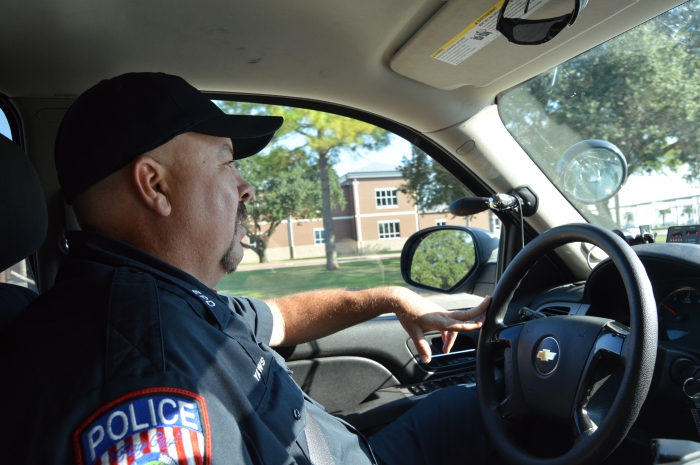A day in the life of a police officer
Submitted by jcht2010 on

He waves to his wife as they pass at the intersection, he in his Edna Police Department Tahoe, monitoring after-school traffic; she in the Mustang he bought her as a gift, on her way to the kids’ football practice. It’s the first time they’ve seen each other all day, and will be the last. He hasn’t stood face-to-face with her in three days.
“Maybe tomorrow,” he says, aloud, but barely.
The Edna Police Department allowed this reporter to ride along with one of its officers for an 11-hour shift to experience first-hand a day in the life of a police officer.
Officer Michael Yaws misses his wife, Anna, misses his kids, but that is the life of a law enforcement officer. He works nights and is sleeping when his family leaves in the morning. They’re asleep when he gets home. They spend time together on his days off.
There aren’t many speeders today, he notices, as he patrols a school zone.
“Sometimes just our presence is enough to deter them, which is good,” he says, “I don’t want to stop anyone any more than they want to be stopped."
He addresses what he says are myths about law enforcement. He says they aren’t out to “get” anyone. They aren’t just stopping people because they don’t like them. He says they are out to keep people safe, and he appreciates when those he encounters understand that.
It’s a scary time to be in law enforcement. He notes that finding new officers is becoming more and more difficult. In fact, the Edna Police Department has an opening now that they’re having trouble filling. It isn’t an easy job. Often, when he shows up, people aren’t happy to see him or his fellow officers. He’s met with yelling, sarcasm, or outright attempts at provoking him to violence. He doesn’t let that happen.
He is grateful, though, for the people who stop him and just say thanks.
“I’ve had people pay for my dinner and say ‘Thank you for what you do’ a lot lately,” he says, “Those people are awesome. It’s good to feel appreciated.”
He stops for a quick dinner at about midnight, hours after his stomach began growling. A case earlier in the night got drawn out for hours longer than expected, and he’s so hungry he can’t even eat much, “if that makes sense,” he says. He’s joined by his partner, Stacy Cavazos, and they joke with each other and the girl who serves their food.
They’re just regular people, and for a few minutes, one could easily forget they’re even wearing uniforms. They’re just two humans, having a bite to eat between assignments. They laugh as they volley insults back and forth in jest. The friendly ribbing passes the time and helps offset the serious demeanor they display on calls. They discuss the events of the night, which has been mostly quiet, save for a couple of traffic stops and a CPS assist, which visibly bothers him.
“Those are hard,” says Yaws, “They break my heart – watching the kids cry, and the moms cry.”
He knows there are people that are always going to blame him for the outcome of situations, regardless of what happens. He sometimes finds himself frustrated, when people make rash judgments and post their opinions on social media.
“Sometimes they post things and blame us,” he said, “and we can’t respond. That could hinder the investigation. So we just have to ignore it. Just let it go.”
Even so, he’s managed to remain unjaded in a profession that is known for being a high Compassion Fatigue occupation. Compassion Fatigue is a condition in which individuals experience less and less compassion over time as a result of frequent contact with trauma. It’s a “desensitizing” of sorts, and is common in nurses, doctors, social workers, and anyone else whose job is to help others. Yaws has managed to keep his heart on the job. He doesn’t judge anyone for their crimes, even expressing hope that some would “get their act together” and become good citizens. He’s seen it happen before, and he appreciates hearing about it.
Overall, he loves his job. Despite its difficulties, he knew what he signed up for when he signed on. The department has been good to him, as have the other Jackson County law enforcement agencies.
“I’ve never seen departments work together like they do here,” he says, “The Sheriff’s Office, the troopers, we can call them and they can call us to help, anytime.”
He likes baseball and enjoys history. He can tell you where all the old buildings in town sit, and what they used to be. He can tell you exactly where every address in the city is. He likes rock music and travelling. Behind the uniform, he hopes people understand that he’s a human being, who loves, thinks, feels, and misses his family while he’s out there keeping Edna in order.
It’s 2 a.m. and Yaws’ shift is over. He heads home to get some much-needed sleep.Cavazos will stay on until the morning, when the day shift comes in. Tomorrow will be much of the same, but an officer never knows when things might change. Each day is appreciated for what it is and Yaws and his fellow officers make sure the people they are charged with protecting get the best they have to offer.
Rate this article:
- Log in to post comments


